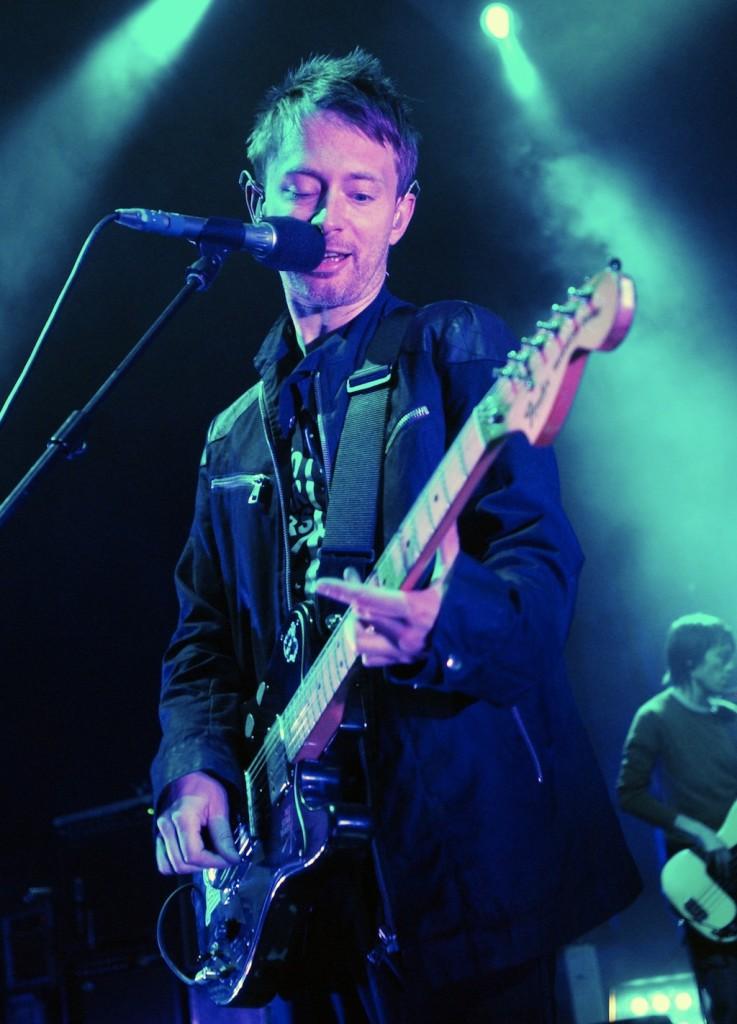Atoms for Peace was created out of Thom Yorke’s solo album, The Eraser. The band consists of Radiohead lead singer, Thom Yorke, Red Hot Chili Peppers’ bassist Flea, Radiohead’s producer Nigel Godrich on guitar, former Beck and R.E.M. drummer Joey Waronker, and Brazilian percussionist Mauro Refosco, who has worked with David Byrne in the past. Needless to say, when a group of talented musicians forms, excellent content is produced. Their new debut album AMOK is now available for download on Itunes, but has been available for streaming from the Atoms for Peace website since the 18th of February.
The album is concise, with only nine tracks, but filled with complicated drum beats, deep basslines, synthesizers, and beautifully executed falsetto vocals from Thom Yorke. Surprisingly, it seems to be a lot more upbeat than a lot of past music that Yorke has done. It opens with Before Your Very Eyes, a five minute track (like most of the songs) that starts off with a tight guitar riff and a protruding, fast drum beat that dives into your ears and stays with you, to make you dance around and jump. But I would say the album is far from dance-music. The drum, percussions and guitars stay throughout the song, with Thom Yorke singing:
Look out of the window
What is passing you by.
If you really want this bad enough.
You’re young and good looking
The keys to the kingdom.
Sooner or later
And before your very eyes
Thom Yorke, as in a large portion of his Radiohead songs, sings about vague subjects in AMOK, giving the listener a way to interpret what he’s trying to get at. This makes his singing mysterious, just as are the instrumentals. Each song creates a difficult understanding of what’s made by a real instrument and what is made by a computer.
Some tracks are very synthesized and quirky, like Default and Unless. Both beginnings of the songs sound like they could be background music in a videogame, but they quickly add muted drum beats or a different rhythm to make the song just more complicated and elegant.
At first listen, it’s hard not to imagine that you are simply just listening to another Radiohead record. Full of bleeps, blops and Thom Yorke’s vocals, it seems like nothing different (but what’s wrong with that anyway?). As BBC’s Wyndham Wallace mentions in his review, Thom Yorke “immerses himself fully in the glitchy electronica that’s inspired him since working on Kid A.” This is very true, and the experimental aspect is strong within the album. For example, the sixth track off the record, Stuck Together Pieces, sounds like a mix of Reckoner off of In Rainbows, and Kid A’s electronica experimental rock aspect. But there is something completely new and different from Radiohead’s music: the rolled over beats and somewhat lighter, happier aspect of the music present in the album, are examples of things we haven’t ever seen Thom Yorke do before. Everyone knows Thom Yorke as the most miserable man of rock and roll, but it seems like he’s lightened up a bit. As Yorke said in his new interview with The Guardian: “’If I can’t enjoy [making music] now, when do I start?’”
To truly enjoy the album, one has to throw away any preconceived notions of what the music will sound like based on the musicians in the band. For example, Flea’s well-known funky bass playing in Red Hot Chili Peppers is nowhere to be found. This ended up angering many RHCP fans. But what is necessary to recognize in this album is the artists’ talent, not how they’re usual music sounds like. It seems that each artist targeted a new, fresh sound in their head that they wanted to create. And AMOK is nothing short of that.
Nonetheless, it seems like every time you listen to it, AMOK sounds stranger than before. You discover a slight bassline change from Flea, or a speed in tempo from Joey Waronker that really shows you what these musicians are capable of.
All in all, AMOK is nothing short of experimental and mysterious, but also familiar at the same time. The mix of artists created high expectations for the album, and the band equally, if not exceeded those expectations. AMOK is a wonderful record that you can sit and decipher for hours, and still never be able to understand fully. That is what makes it a great album, that keeps you hanging and coming back for more.

